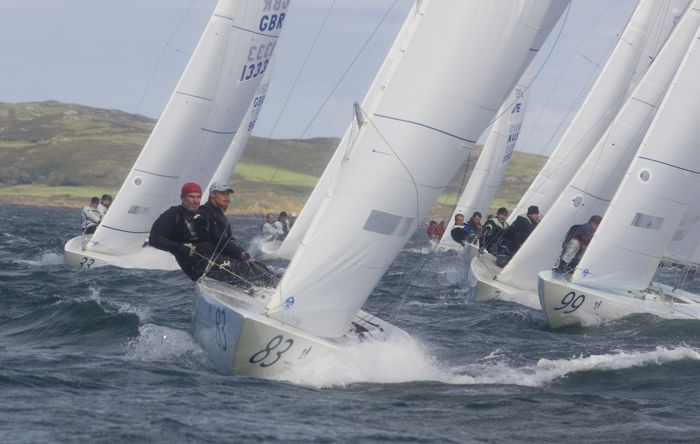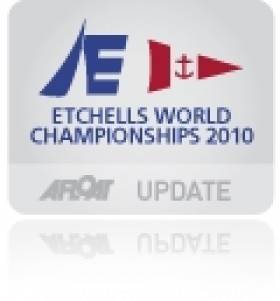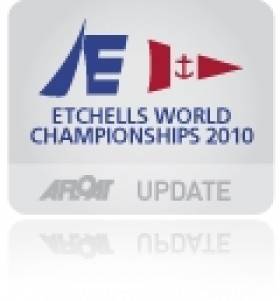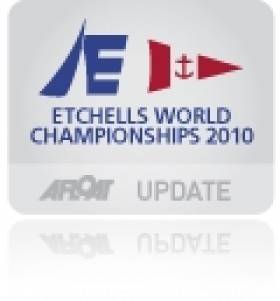Displaying items by tag: Etchells World Championships
Bertrand double at Howth to lead Etchells Worlds
Two bullets give Australian crew 11 point lead after four races
John Bertrand of Royal Brighton YC in Melbourne gave a masterclass on the waters off Howth to win both races in today's Etchells World Championships, sponsored by Fingal County Council, to open up a significant lead over main rival Ante Razmilovic of the UK.
With crewmen Andrew Palfry and Tom Slingsby, the Australian legend won the first race in light airs and when the wind strength increased, for the second race, their downwind speed in particular was outstanding. Three Australian crews are now in the top five.
Lack of wind early in the day forced an hour's postponement and although light 7-8 knot easterlies prevailed for the duration of the 2-hour race, it was more than adequate for the 41-boat fleet. The championship pace-setters Razmilovic and Bertrand again showed the way, this time with the Melbourne crew notching their second win of the series. Razmilovic's second place put him and Bertrand level on 7 points to extend their position at the top of the leaderboard after three races.
It was a good morning for the European Champion Jay Bourke and crew on 'Northside Dragon' from Howth. They were consistently in the top five for the whole race and claimed third spot by the finish for their best result so far. The next best of the Irish were David Burrows and Dan O'Grady in 12th and 16th places respectively
2009 Worlds runner-up Damien King of Australia, third overall going into the race, had to settle for 9th, a result which allowed the UK's Graham Bailey (5th in the race) to narrow the gap just one point. Nils Razmilovic (Singapore) scored a 6th to move within a point of Bailey.
An increase in wind strength had been forecast for the afternoon and by the start of Race 4, a 10-knot easterly greeted the fleet. It was an Aussie 1-2-3 at the first windward mark with Damien King, Bertrand and Jake Gunther leading the pack but Bertrand's downwind speed gave him the lead by the leeward gate, an advantage which he extended as the race went on.
Laurence Mead of Royal Corinthian YC was in contention throughout the race, finishing a good 2nd ahead of Gunther, Nils Razmilovic (Singapore) and King in 5th. Eighth and ninth for David Burrows and Dan O'Grady represented the leading Irish finishers, with Burrows moving up to 11th in the overall standings. Three points separating 2nd from 4th illustrates how tight the competition is in this premier one-design class
Two races are scheduled for Thursday (26th) with a forecast for stronger wind conditions
Etchells World Championships – after 4 races:
John Bertrand – Australia – 8 points Ante Razmilovic – Britain – 19 points Damien King – Australia – 21 points Nils Razmilovic – Singapore – 22 points Jake Gunther – Australia – 30 points Graham Bailey – Britain – 32 points

John Bertrand leading a race in Howth
Razmilovic heads Etchells Worlds fleet after two races
The 2010 Etchells Worlds Championships started at Howth today (Monday 23rd) with two scheduled races sailed in freshening winds, with Ante Razmilovic of the UK holding a one point lead over Australian sailing legend John Bertrand at the end of the first day.
The first race, sailed in westerly winds steadily increasing in strength, saw Razmilovic open up a large lead by the windward mark, having gone to the right of the course on the first leg. While the 2009 Worlds runner-up Damien King of Australia closed the gap over the next three legs, it was not enough to deny the British boat a comfortable win.
Another British entry, Graham Bailey took third ahead of the winner's brother Nils Razmilovic (sailing for Singapore) while John Bertrand finished fifth. The leading Howth entry was Stephen Quinn & Stephen O'Flaherty in 11th place.
Winds had freshened considerably to 24 knots by the start of the second race, conditions which lead to some gear damage and one major collision. The conditions were, however, very much to the liking of Australian crews who filled the first three places.
John Bertrand took the gun ahead of his Royal Brighton YC clubmate Jake Gunther while former World Champion Peter McNeill, who recently won the Irish national title, took third spot ahead of Ante Razmilovic. Dan O'Grady of Howth was the best of the Irish in 15th place.
That result left Razmilovic the overall leader on five points after two races, one ahead of Bertrand and with Damien King in third place on seven points. The leading American entry is Jud Smith of Eastern YC in 6th while the top Irish boat in the overall standings is Howth's Stephen Quinn/Stephen Flaherty in 11th place.
Racing continues on Tuesday (24th) with one race scheduled on the programme.
Etchells World Championships (provisional results after two races):
Swedish Blue (UK) – Ante Razmilovic – 5 pointsTriad (Aus) – John Bertrand – 6 pointsBarry (Aus) – Damien King – 7 pointsArbitrator (UK) – Graham Bailey – 12 pointsMatatu (Singapore) – Nils Razmilovic – 12 points1224 (USA) – Jud Smith – 19 points
43 entries for Etchells Worlds starting at Howth
The Etchells World Championship starts at Howth Yacht Club on Monday (23rd August) with 43 boats from nine countries confirmed to contest the 9-race series.
Some of the world's top sailors, including Olympic medallists and former World Champions, will be in action in the event supported by the Fingal County Council, Dublin Tourism and the Irish Sports Council. Over 130 Etchells sailors will participate and in addition to the 12 Irish boats which qualified for the event, entries have been received from Australia, USA, UK, Holland, Italy, Singapore, Bermuda and the Bahamas.
Among the overseas entries are America's Cup winner John Bertrand from Melbourne; last year's runner-up Damien King from Sandringham YC, Australia; former US Rolex Sailor of the Year Jud Smith from Marblehead; US Winter Series winner Marvin Beckmann from Houston; and Argyle Campbell from Newport Harbour.
Fifteen of the overseas entries participated in last weekend's Irish National Championships, sponsored by Euro Car Parks, to familiarise themselves with the Howth waters, with former World Champion Peter McNeill from Sydney, Australia winning the title ahead of Britain's Julia Bailey. Ireland's top qualifier, Dan O'Grady and his crew from Howth, finished 3rd overall.































































